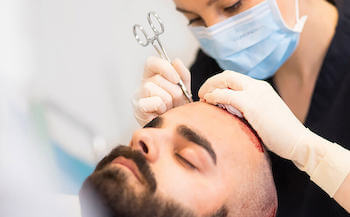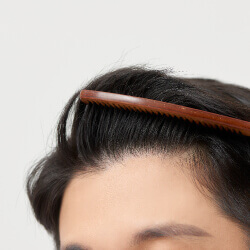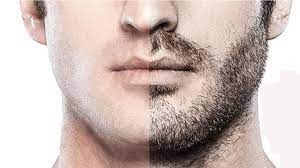Shock hair loss after hair transplant operations is the temporary loss of hair strands transplanted into the area of hair loss. This is an extremely normal process which is experienced after every hair transplant operation, but it may cause anxiety and disappointment for the patients as it is unexpected and they are not prepared for it.
Although there is no definite time frame for shock hair loss, it generally happens between 1-3 months after hair transplantation. It is generally completed within a period of 2 weeks, although it may vary from person to person. Experiencing shock hair loss after transplantation is an extremely normal condition, as well as completely temporary.
Shock hair loss is experienced only once. After this shock loss, there is no new shedding or thinning of hair in the transplanted hair follicles.

In the hair transplantation process, the donor area is the nape (back of the head). That is because the hair on this area is not affected by the shedding caused by the male hormone. Therefore, hair follicles taken from the back of the head maintain their resistance to shedding after hair transplantation operation, too.
While the severity of the loss varies from person to person, there are rare people who have not experienced shock hair loss. This sudden and temporary hair loss is not an indication that the hair transplantation will fail, on the contrary; it is a precursor for new and high quality hair strands. The shock loss process is not exclusive to hair transplantation procedures. Patients experience shock losses after beard, mustache or eyebrow transplantations as well. In short, shock hair loss takes place after all kinds of transplantation operations.
Things To Consider During The Shock Loss Period
In order to go through the shock hair loss period comfortably and to guarantee the healthy growth of new hair strands, it is beneficial to be a little meticulous during this period. Paying attention to some points and being sensitive will help this period to result in patients’ advantage.
● Healthy diet: One of the most important issues to be considered in the early period after the operation and during the shock loss process is eating healthy. It ensures the newly growing hair to be healthy and of high quality and also ensures that the patient has a healthy lifestyle in general. During this period; It is essential to consume foods rich in nutritional value instead of foods high in saturated fat, and to supplement the vitamins and proteins needed by the body and hair.
● Water consumption: It is important to consume enough water and not to leave the body dehydrated since consuming enough water helps the transplanted roots to be nourished more easily.
● Using the recommended products and shampoos: Shampoos and lotions recommended by your specialist doctor provide the sensitive and necessary care required by both the recipient and donor areas after the operation. Therefore, you should keep using the recommended products which provide the necessary care for the hair follicles and growing hairs.
● Quitting smoking, alcohol and caffeine consumption (as much as possible): These are the substances that has negative effects on hair health and they also reduce hair quality. Hair follicles which try to adapt to their new place may become even more sensitive due to smoking, alcohol and caffeine consumption and it may negatively affect the result of the operation.
● Avoiding excessive sports and situations that will cause excessive sweating: After hair transplantation, sweating of the head area and the patient’s exhaustion may cause damage to the fragile and sensitive hair follicles. Practising excessive sports is definitely not recommended as they will increase sweating in the operated area and cause exhaustion.
When Will My Hair Grow After Shock Loss?
New hair starts to grow 1-2 months after the shock loss period ends. In the early days, the growing hair is curly and thin but it gets stronger day by day and regains its normal form. During the growth phase, each hair strand grows about 1 cm per month. In the 5th or 6th months after the transplantation, some hair strands may still be weak. This is perfectly normal. As of the 10th month, the hair follicles are now fully adapted to their places, so the hair strands become thicker and look more natural. The hair reaches up to its normal density. All in all, hair transplantation is a process that takes up to 1 year to give full results.
Clinic Center provides both online and physical aftercare service for treated patients for 1 year. Just after the treatment is completed, a specialist is assigned to the patient from aftercare department to assist for all questions during healing process. In case of having more complicated situation or for any medical concern patients can visit any clinic that we are cooperating to have a physical check up with doctor.




